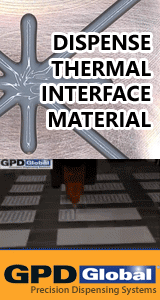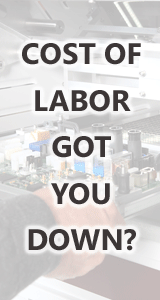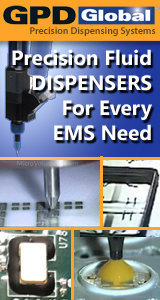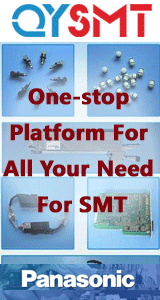Steve: A couple years ago, I decided that I needed to broaden my education in the areas(s) that I make my livelihood � soldering and assembly. I had attended some excellent (and some not so excellent) tutorials at NECON, but just felt I was missing so much. So, every other month I buy AND READ a book related to the business that I love and that feeds me and my family � electronic assembly.
So that gets us to the next problem � the point of your question � "How do I know which books are good?" "Books are expensive, which are worth the money?" "And how can I buy them as inexpensively as possible?" The final element of the problem � "I�ve read all the books I ever wanted to read in college / I don�t read / I�m so whipped by the time I get home, I all I want to do is watch Whoopie / etc etc" is something you should talk to someone else about.
Sorry to be repetitous, but the first and best screen, for me, is SMTA. They offer a wide range of topics that are screened by their reviewers (although some are getting a bit stale); better than average prices, especially for members; and good shipping response. If you buy a couple books a year and attend a meeting or two a year, that�ll pay for your membership, $75 or so. Plus you get a lapel pin!!!! Watttza lapel anywho? Finally in response to this part of your question, you�ll find THE BOOK at SMTA (www.smta.org).
Second, SMTnet has started a new book review, on-line talk to the author series that debuts in May. (I know it�s May now, chill it's coming) I have reviewed C Harper "Electronic Packaging & Interconnect Handbook." Wolfgang is doing a J Lau book on flip chips (I believe) in June (I believe). Periodically, Keith, at SMTnet, posts a itty, bitty, tiney, weenie, banner up near the top of the SMTnet page on this, as teaser. (Hey Keith, is this good PR er watt?)
Third, Brian Ellis, before he got frustrated with the very nice people that run SMTnet and left in disgust, reviewed some books in the news letter. They should be in the news letter archives. (I assume there is such a thing) Brian is the author of a book on board cleaning published by Electrochemical Publications � same as THE BOOK and other books focused on electronic assembly.
Forth, continuing with SMTnet, they have probably the broadest and longest list of industry books out there, many with extensive reviews attached.
Fifth, Bob Willis, who also used to participate on SMTnet, published his top ten. Bob Willis' Top Ten: "Microelectronics Packaging Handbook," Tummala and Rymaszewski, Van Nostrand Reinhold "Solders and Soldering," Manko, HH, McGraw Hill "SMT for PC Board Design," Hollomon, J, Howard W. Sams "Soldering in Electronics," Klein Wassink, Electrochemical Publications "Printed Circuit Handbook," Coombs Jr, C, McGraw Hill "Handbook of Printed Circuit Design, Manufacture, Components & Assembly," Leonida, G, Electrochemical Publications 1981 "Ball Grid Array Technology," Lau, J, McGraw Hill "Flexible Circuit," Fjelstad, J, Electrochemical Publications "Quality Assessment of Printed Circuit Boards," Lund, P, Bishop Graphics "Scientific Guide to Surface Mount Technology," Lea, C, Electrochemical Publications
Sixth, anything that Jim Blankenhorn lists on SMT Plus is good.
Seventh, try Computer Literacy. Their site is bighead or something like that, look it up.
Eighth, try the sites of professional societies (ie, ASQC, IEEE, ASME, ASM), they will recommend top flight books.
Nineth, try the sites of professional groups (ie, IPC, EOS/ESD), they will recommend top flight books.
Tenth, many of these books are available from the online book sellers (ie, amazon, bn, borders)
Finally, if you�re really cheap (like me), and don�t mind having a book that�s not the latest and greatest edition and may be a little shop worn, buy a used book. Search on the sites yourself � that�s my home.
Good luck Dave F
reply »
![]() Looking for the best choice in books on soldering processes...
- May 05, 2000
by
Steve Thomas
Looking for the best choice in books on soldering processes...
- May 05, 2000
by
Steve Thomas
![]()
![]()
![]() Hi Steve: Easy question, Klein Wassink is THE BOOK. It is...
- May 06, 2000
by
davef
Hi Steve: Easy question, Klein Wassink is THE BOOK. It is...
- May 06, 2000
by
davef
![]()
![]()
![]() Thanks Dave. Figured you'd come through on that one.
An...
- May 08, 2000
by
Steve Thomas
Thanks Dave. Figured you'd come through on that one.
An...
- May 08, 2000
by
Steve Thomas
![]()
![]()
![]() Hello Steve
Most of these are available from the SMTA books...
- May 08, 2000
by
John Thorup
Hello Steve
Most of these are available from the SMTA books...
- May 08, 2000
by
John Thorup
![]()
![]()
![]() Thanks, John. I'm either in need of a vacation, or we need...
- May 08, 2000
by
Steve Thomas
Thanks, John. I'm either in need of a vacation, or we need...
- May 08, 2000
by
Steve Thomas
![]()
![]()
![]() Steve: A couple years ago, I decided that I needed to broa...
- May 08, 2000
by
davef
Steve: A couple years ago, I decided that I needed to broa...
- May 08, 2000
by
davef
![]()
![]()
![]() Don't ever leave, Dave. ...
- May 09, 2000
by
Steve Thomas
Don't ever leave, Dave. ...
- May 09, 2000
by
Steve Thomas
![]()







